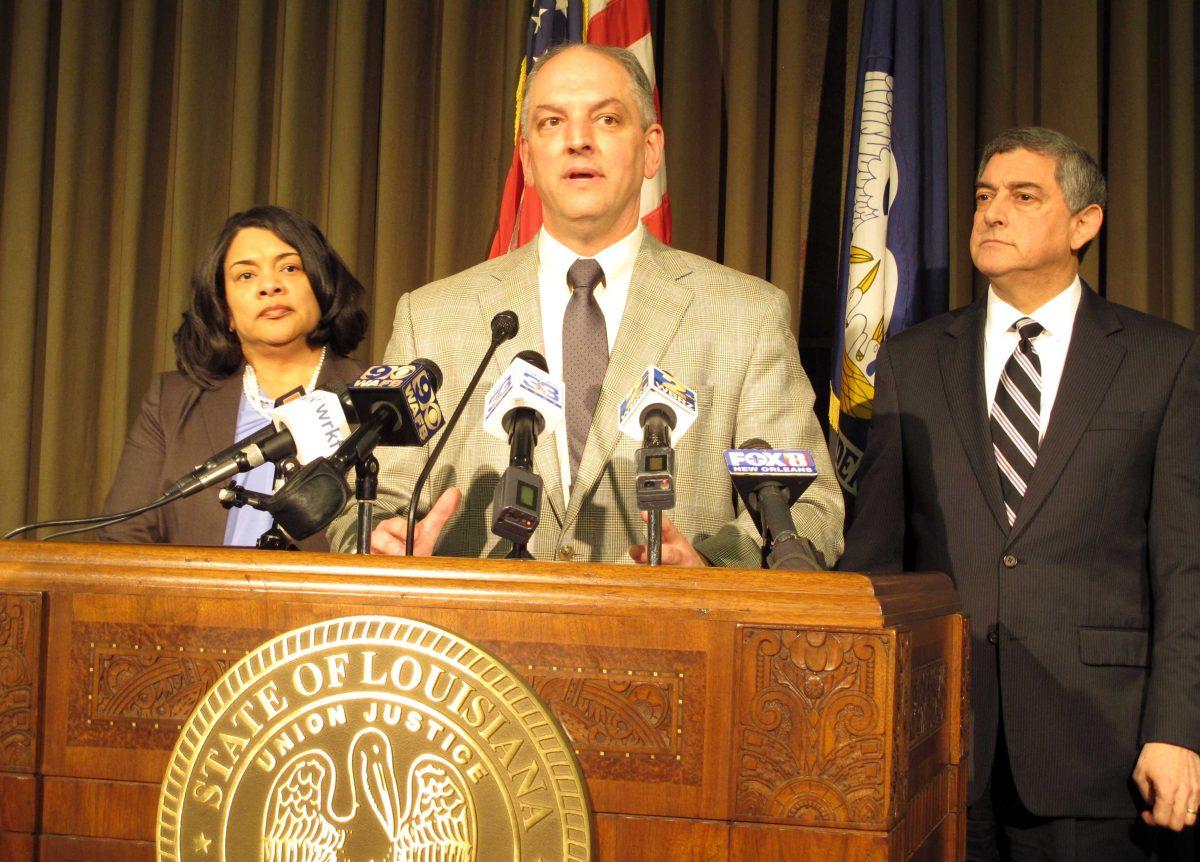Less than a month before lawmakers trudge to the Capitol on Valentine’s Day to stop the bleeding in the state’s budget, Gov. John Bel Edwards proposed tax increases and various spending cuts Tuesday to alleviate the estimated $750 million shortage for the current fiscal year, which ends in June, and nearly $2 billion deficit for next year. Edwards has stated plainly that education funding will be his No. 1 priority.
Edwards’ proposal for budget fixes comes as the annual budget cut battle heats up, with higher education advocates pleading their case.
LSU President F. King Alexander, who has often decried the state of higher education funding, joined higher education leaders from throughout the state Wednesday to meet with the governor about the funding dilemma. LSU has faced threats of potential drastic cuts to the school in recent years, and students have protested at the Capitol for a voice in the decisions.
“Without legislative intervention, LSU will have to take significant steps to mitigate cuts,” Alexander said in a statement. “We aren’t left with many appealing options, but the numbers don’t lie.”
Edwards’ campaign largely sidestepped the possibility of raising taxes last fall as Edwards focused on the priorities of the state, with education at the top of the list. All the candidates pointed instead to cutting inefficient tax giveaways and credits, but Edwards’ administration, which includes former gubernatorial candidate Republican Jay Dardenne, said cuts alone will not bridge the gap when Edwards announced his proposal Tuesday.
Board of Regents Chair Richard Lipsey, who supported Dardenne initially before endorsing Edwards in the general election, worked on Edwards’ transition team as a voice for higher education. He vowed to help Edwards through this financial “crisis,” as many needs of universities all over the state remain unmet.
“We’ve got to look long-term and we understand the difficulties right now in the budget,” Lipsey said. “At this point in the game, I am not going to be critical. I want to be helpful. Whatever it takes to put our state on a firm financial basis, we’ll pledge our support to work with the governor.”
Edwards has said the budget must be structurally fixed in order to properly fund higher education, which he said has been thrown on the chopping block, if not cut drastically, each time a major deficit cropped up under former Gov. Bobby Jindal.
The governor ran on specific policy proposals for higher education, with restoring state support to higher education for a “50-50” funding model as a priority.
The “50-50” approach means 50 percent of higher education costs in the state will come from the state, and 50 percent will fall on students and parents when they pay tuition.
The model, he has argued, will bring sustainability to a higher education system in Louisiana that has crumbled under Jindal’s administration. In 2007, the state paid for 60 percent of college costs. After Edwards assumed office, the number sits at 24 percent, with students taking on 76 percent of the cost burden.
Economics professor James Richardson delivered a report with Tulane University professors and Tax Foundation researchers to the Legislature last year on recommendations for effective revenue raising.
His report, which he said represents “good economic policy,” lines up with Edwards’ proposal. Richardson said the governor put his recommendations on income tax and corporate income tax changes on the table, but there is work to be done in persuading the Legislature.
“This policy at least has the general nature that we will generate enough money to fund higher education,” Richardson said. “Now, will it happen? That depends on the will of the legislature and their opinions, and their preferences. There’s still a long way to go in getting it finalized.”
The Taylor Opportunity Program for Students, which grew to more than triple its original budget, has been a symbol for political and education leaders in inefficiencies in state spending.
While few specifics were given for reigning in TOPS during the 2015 gubernatorial race, Edwards held firm in the belief that if state support is restored to higher education, TOPS will remain sustainable.
But he acknowledged that the state must fix structural problems in the budget, which he asserted were a product of “failed Jindal policies,” and use of “one-time money.”
“The last eight years of bad budgeting and annual cuts to vital services have left us in a fragile position. There is no sugar coating that fact,” Edwards said in a statement. “We must fix this or continue catastrophic cuts that would result in our hospitals closing, universities and community colleges filing for bankruptcy, the erosion of the TOPS scholarship program and severe reductions to our public K-12 schools.”
Edwards propses tax increases, spending cuts to alleviate budget shortage
By Sam Karlin
January 21, 2016
Louisiana Gov. John Bel Edwards, center, unveils his proposals for balancing Louisiana’s budget, including a list of tax increases for legislative consideration, during a news conference, Tuesday, Jan. 19, 2016, in Baton Rouge, La. Joining Edwards are Revenue Secretary Kimberly Robinson, left, and Commissioner of Administration Jay Dardenne. (AP Photo/Melinda Deslatte)
More to Discover








